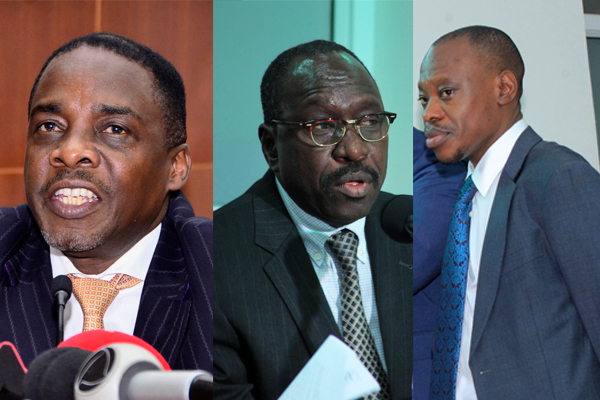Uganda names 19 experts to fight DRC plunder case

Mr William Byaruhanga, Mr Francis Atoke and Mr John Bosco Suuza
What you need to know:
- DR Congo sued Uganda at the Hague-based court in 1999 over acts of armed aggression that violated the United Nations Charter and the Charter of the Organisation of African Unity, the predecessor of the African Union.
Government has assembled a team of 19 local and international experts in the proceedings on reparations in the case before the International Court of Justice (ICJ) concerning Uganda’s armed activities in neighbouring DR Congo between August 1997 and June 2003.
The proceedings convened in a hybrid format—with some members attending at the Hague, Netherlands, and others via video link—resume today to thrash out the long-standing issue of $10 billion (about Shs36 trillion) reparations.
Those attending in person, highly-placed diplomatic sources told Daily Monitor, include Attorney General William Byaruhanga, Uganda’s envoy to Brussels Mirjam Blaak, Solicitor General Francis Atoke, the Commissioner for Contracts and Negotiations in the Ministry of Justice, Mr John Bosco Suuza, and the Chieftaincy of Military Intelligence (CMI) Director for Legal, Col Timothy Kanyogonya.
Others are international lawyers Yuri Parkhomenko and Lawrence Martin of the Washington DC-based law firm, Foley Hoag LLP, specialising in public international law and representing sovereign States in disputes with other states or foreign investors, and University of Louvain law don Pierre d’Argent, an expert in international law and tribunals.
These legal brains, Attorney General Byaruhanga detailed in a March 26 correspondence to the court’s registrar, will be assisted via video link by George Washington University law Professor Sean Murphy, University of Oxford Professor Dapo Akande, and Paris Nanterre University Professor Alain Pellet.
Rounding up the team of 19, are the deputy Solicitor General, Mr Christopher Gashirabake, the acting Director of Civil Litigation in Justice ministry, Ms Christine Kaahwa, Foreign Affairs ministry’s acting Director of Regional and International Affairs, Mr Arthur Kafeero, and State attorneys Jeffrey Atwine, Richard Adrole, Fadhil Mawanda, Geoffrey Madete, and Mr Alex Byaruhanga. These will join in via video link from Kampala.
Diplomatic sources said the case is in its final leg, following judgment in DR Congo’s favour in 2005. The two sides were tasked to negotiate the possible reparations, after the International Court of Justice fined Uganda $10 billion for the plunder of DR Congo resources during its 1997-2003 invasion.
Despite the stand-off, Kampala and Kinshasa seemingly have proper bilateral relations, with Uganda offering to upgrade about 500kms of roads in eastern DR Congo to bitumen to ensure vital trade among the mineral-rich cities.
Mr Byaruhanga told the parliamentary legal committee in January last year that although they were trying to discuss with DR Congo out of court, Kinshasa had proposed $23b (Shs85t) as reparations while Uganda had counter-offered $150m (about Shs558b).
Owing to the failure by both sides to reach an amicable settlement, the ICJ last September assembled a team of international experts on the possible reparations by Kinshasa, specifically on loss of human life, natural resources and property during the invasion by Uganda.
Sources say the experts have since submitted their report to court.
The case
DR Congo sued Uganda at the Hague-based court in 1999 over acts of armed aggression that violated the United Nations Charter and the Charter of the Organisation of African Unity, the predecessor of the African Union.
Uganda eventually lost the case in 2005 when its legal team erred after they submitted to the court as its evidence a report of a commission of inquiry chaired by Justice David Porter, which had implicated senior government officials.
The report confirmed pillage of DR Congo’s resources between 1998 and 2001, but absolved implicated top Uganda government and military officials including President Museveni’s brother Salim Saleh whom a 2001 UN panel of experts named adversely in its report on illegal exploitation of Congo’s wealth.



